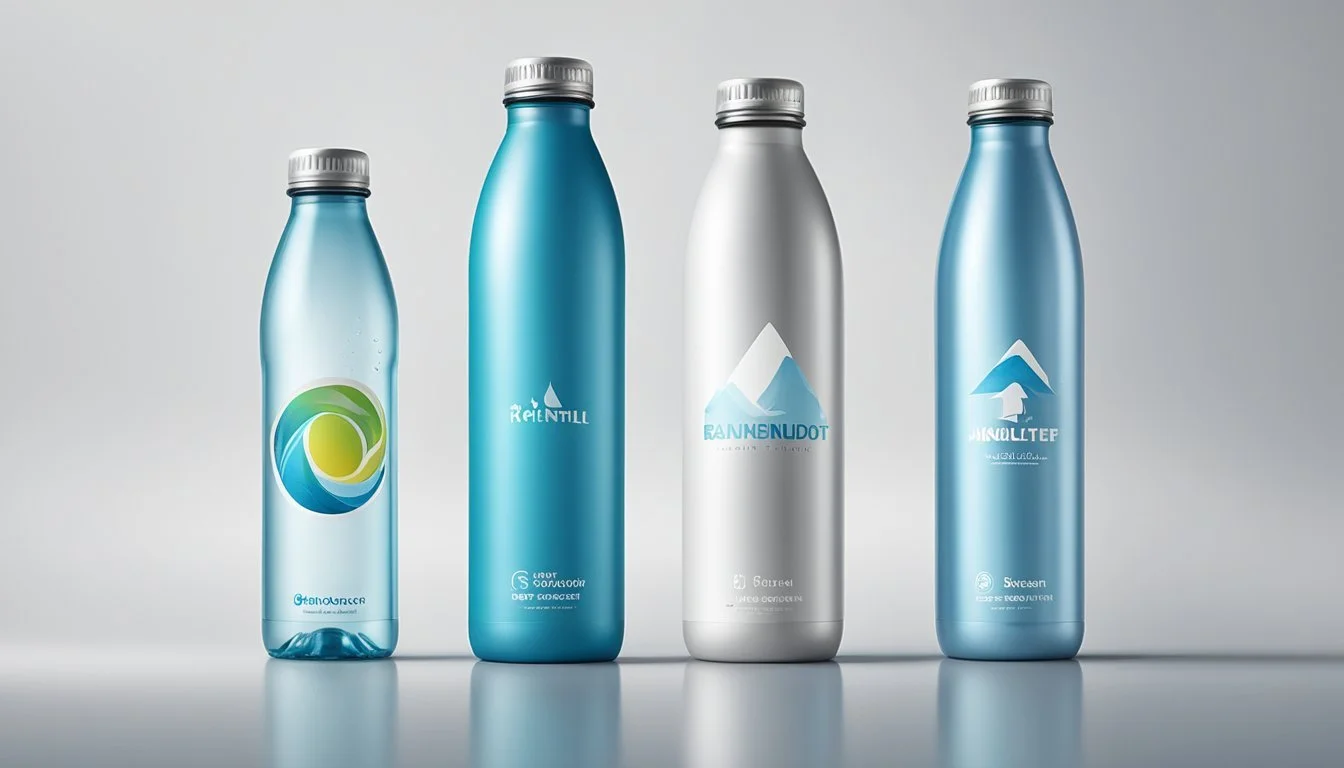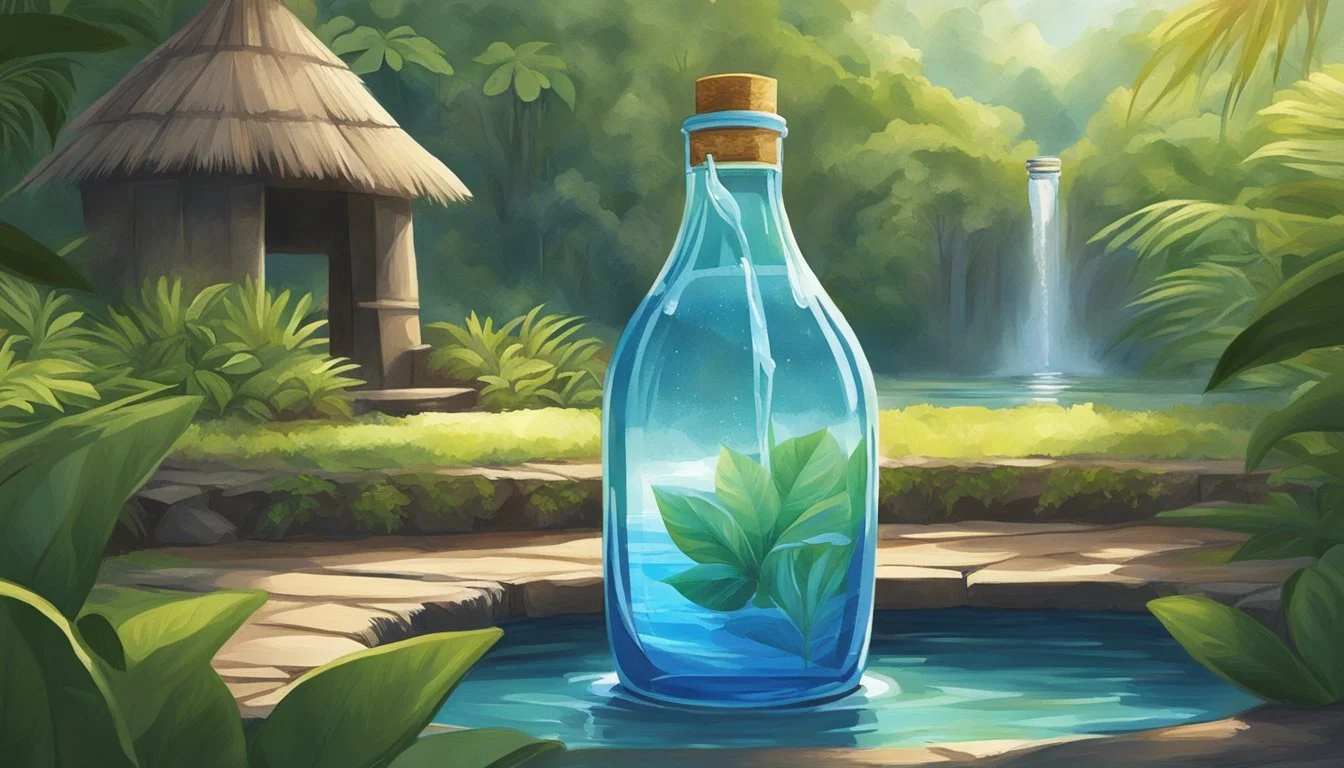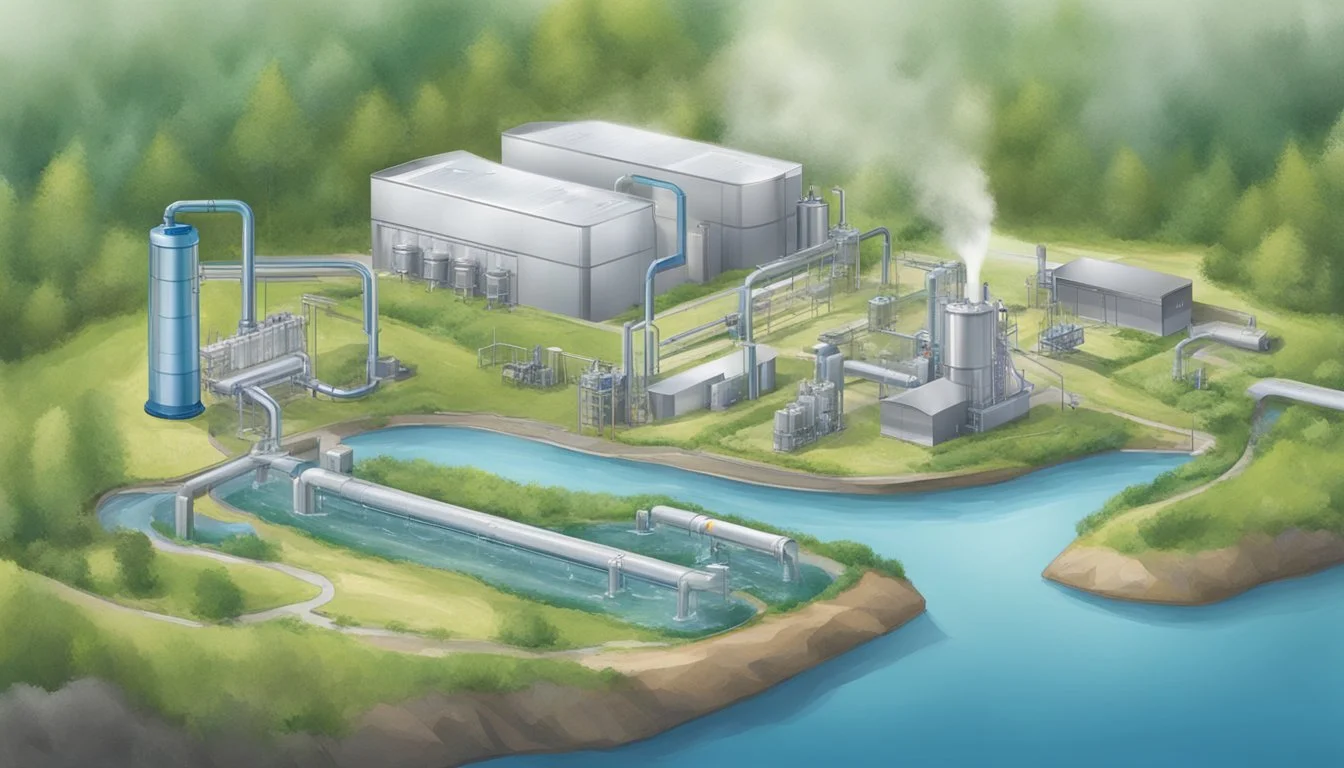Waiakea vs. The Well
Comparing Bottled Water Quality and Benefits
In the saturated market of bottled water, consumers often face the dilemma of choosing between various brands promising unique benefits. Waiakea and The Well both stand out with their distinct offerings. Waiakea water, sourced from Hawaii's volcanic mountains, is known for its natural alkalinity and mineral-rich content, providing potential health benefits such as better hydration and neutralizing body acidity.
In contrast, The Well positions itself as a premium purified water brand, emphasizing its rigorous purification processes that ensure high purity and safety for everyday consumption. While The Well opts for significant filtration to remove impurities, it might lack the naturally occurring minerals found in Waiakea, which some consumers might find beneficial for overall health.
Both brands cater to different preferences and needs, making the decision dependent on what consumers value more—natural mineral content and alkalinity from Waiakea or enhanced purity and safety from The Well. Choosing the right bottled water depends on understanding these differences and aligning them with personal hydration and health goals.
Comparing Water Sources
Understanding the origins and sources of bottled water can greatly influence consumer choice. Waiakea and The Well offer distinct water sourcing, each with its unique environmental and health benefits.
Waiakea: Hawaiian Volcanic Water Source
Waiakea water is sourced from the Mauna Loa Volcano in Hawaii. The water originates from snowmelt and rain, which filters through 14,000 feet of volcanic rock. This natural filtration process enriches the water with essential minerals and electrolytes, contributing to its alkalinity with a pH level ranging from 7.6 to 8.2.
Sustainability is a crucial aspect of Waiakea’s sourcing practices. The company leverages a 100% RPET (recycled polyethylene terephthalate) packaging and participates in various environmental initiatives, including reforestation and clean water access projects. These practices ensure that Waiakea contributes positively to the environment and local communities.
The Well: Artesian Water Source
The Well sources its water from a deep artesian aquifer. Artesian water comes from a confined aquifer where the water is under pressure, forcing it to the surface naturally without the need for external pumps. This source is known for its purity and consistent mineral content.
Sustainability practices for The Well include responsible extraction processes that protect the aquifer from depletion. They ensure the balance of the ecosystem is maintained, supporting regional conservation efforts. Community engagement and support play a significant role, with initiatives aimed at maintaining local water resources and promoting sustainable consumption.
In summary, the unique sourcing methods of Waiakea, with its volcanic origins, and The Well, with its artesian source, offer distinct benefits and sustainability practices catering to different consumer needs and preferences.
Chemical Composition and Health Impact
The chemical composition and health impact of Waiakea and The Well bottled waters are key factors for consumers deciding which is better. They differ in pH levels, mineral content, and total dissolved solids (TDS), impacting health benefits and drinking experience.
pH Level and Alkalinity
Waiakea has a naturally alkaline pH range of 7.6 to 8.2, beneficial for those looking for water with a higher pH. This alkalinity can help neutralize acid in the bloodstream, potentially offering health benefits such as better hydration and balanced body pH.
The Well, in contrast, typically offers a neutral pH close to 7. This suits individuals preferring a balanced taste without the distinct characteristics of alkaline water. While not offering the same potential benefits as alkaline water, it is a solid choice for everyday hydration.
Alkalinity is crucial for health-conscious consumers interested in the potential benefits of less acidic water. Understanding these differences in pH levels can guide consumers to choose the water that aligns with their health goals and taste preferences.
Mineral Content and Benefits
Waiakea is rich in minerals like calcium, magnesium, and sodium, which are essential for various bodily functions. Calcium supports bone health, while magnesium aids muscle function and electrolyte balance. Sodium, though minimal, contributes to cellular function and hydration.
Additionally, Waiakea contains silica, known for its positive effects on skin, hair, and nails. Silica also plays a role in collagen synthesis, which is beneficial for overall tissue health.
The Well focuses on delivering pure, clean water with minimal additives and a subtle mineral profile. While it may not match Waiakea's high mineral content, it still provides the basic benefits of hydration without additional minerals that some may prefer to avoid.
Total Dissolved Solids and Purity
The TDS level of Waiakea is approximately 74 mg/L, indicating the presence of beneficial minerals and electrolytes. This level contributes to its distinctive, slightly sweet taste while providing essential nutrients that can enhance overall health.
The Well boasts a lower TDS, reflecting its purity and absence of significant mineral content. This makes it an excellent choice for those who prefer water with less distinct taste and are sensitive to dissolved solids.
TDS can impact both the taste and the health benefits of the water, making it an important factor for consumers who prioritize either mineral benefits or purity in their bottled water options.
Taste and Quality Assessment
Both Waiakea and The Well offer unique flavor profiles and quality elements that cater to various tastes and preferences. This section provides a comprehensive evaluation of their taste, mineral impact, and aftertaste qualities.
Flavor Profile Comparisons
Waiakea water is naturally alkaline with a pH of 8.2, providing a smooth and slightly sweet flavor. It's sourced from Mauna Loa volcano in Hawaii, which contributes to its distinct taste profile.
The Well, often sourced from multiple natural springs, offers a more neutral taste. This neutrality appeals to those who prefer their water to have minimal flavor interference with their palate. Both brands aim to deliver a refreshing drinking experience, but the specific flavor notes can cater to different personal preferences.
Impact of Minerals on Taste
Waiakea's volcanic filtration enriches it with natural minerals such as calcium, magnesium, and silica. These minerals not only enhance hydration but also contribute to its smooth and slightly sweet taste. The naturally occurring electrolytes in Waiakea add a subtle but noticeable crispness.
The Well, in contrast, focuses on providing a more pristine and pure flavor. Its mineral content is lower, which results in a cleaner, more neutral taste. The difference in mineral content between Waiakea and The Well can affect how refreshing their water feels to different palates.
Aftertaste and Refreshment Factor
Waiakea's naturally alkaline properties contribute to a clean aftertaste, leaving a refreshed feeling without any lingering bitterness. The unique mineral blend ensures that the water remains light and smooth on the palate, enhancing the overall refreshment factor.
On the other hand, The Well’s commitment to purity results in no discernible aftertaste. This quality can be particularly appealing for those who prefer a more neutral drinking experience. The Well's absence of aftertaste accentuates its clean and direct hydration factor, suitable for a wider range of personal preferences.
Packaging, Branding, and Accessibility
Waiakea and The Well are known for their unique branding, eco-friendly packaging options, and varying degrees of market accessibility. These factors significantly influence consumer preferences and perceptions of both bottled water brands.
Eco-friendly Packaging Options
Waiakea uses rPET (recycled polyethylene terephthalate) for their bottles, which minimizes their environmental footprint. Their packaging is designed to be biodegradable and carbon-neutral, aligning with sustainable practices. They claim that their packaging breaks down faster than traditional plastics and reduces carbon emissions during production.
The Well focuses heavily on using glass bottles to help eliminate plastic waste. Glass is easier to recycle and doesn’t leach chemicals into the water, making it a preferred choice for environmentally conscious consumers. Both brands prioritize sustainability, yet their approaches cater to different aspects of eco-friendly packaging.
Market Availability and Consumer Reach
Waiakea can be found in a variety of locations, including major grocery stores, convenience stores, and even online platforms. Its wide distribution channels make it easily accessible to consumers across different regions. The brand has garnered positive reviews for its availability and consistent quality.
The Well, while also available in some grocery stores and specialized health food stores, tends to have a more limited reach in comparison. It is often marketed towards niche markets that prioritize eco-friendly products. This selective market presence means that availability may be more restricted based on geographic location.
Bottled Water Branding
Waiakea’s branding emphasizes its Hawaiian origin, natural alkalinity, and volcanic filtration process. This unique selling proposition is reflected in their vibrant and island-inspired packaging, which appeals to consumers looking for premium, exotic bottled waters. The brand also highlights its commitment to sustainability and clean water initiatives.
The Well opts for a minimalist branding approach, focusing on elegance and purity. Their simple yet sophisticated design aims to attract consumers who appreciate high-quality, sustainable products. The brand conveys a message of luxury and environmental responsibility, positioning itself as a premium choice among bottled water brands.
By combining innovative packaging solutions with strategic branding efforts, both Waiakea and The Well manage to capture the interest and loyalty of environmentally conscious consumers.
Environmental Impact and Sustainability Practices
Waiakea and The Well prioritize unique sustainability measures to reduce their environmental footprint and ensure responsible water sourcing. The focus is on sustainable water sources and minimizing the impact of production and distribution.
Water Source Sustainability
Waiakea sources its water from rain and snowmelt filtered through porous volcanic rock in Hawaii. This natural filtration process enhances water purity while maintaining sustainability. The company uses less than 0.003% of the volcano's sustainable yield.
The Well sources its water from protected springs. The brand emphasizes sustainable yield management to ensure long-term water availability. Both companies focus on eco-friendly sourcing to maintain natural ecosystems.
Production and Distribution Footprint
Waiakea uses environmentally friendly materials in its packaging, specifically high-grade 100% rPET (post-consumer recycled PET). This choice uses 85% less energy, 99% less water, and reduces carbon emissions by 79% compared to virgin plastic. Additionally, Waiakea is certified Carbon Neutral.
The Well employs sustainability practices in its production, including the use of renewable energy. The company's commitment extends to optimizing logistics to reduce carbon emissions. Both brands strive to minimize their environmental impact through innovative sustainability practices.
Health Considerations and Safety Standards
Ensuring the safety and health benefits of bottled water requires examining both the presence of contaminants and the nutritional value offered by essential minerals.
Absence of Contaminants
Purity is critical when assessing bottled water quality. Waiakea water undergoes extensive volcanic filtration, naturally filtering out potential contaminants. This method also enriches the water with minerals. Stringent safety standards ensure it remains free from harmful substances such as PFAS chemicals, lead, and heavy metals.
The Well water implements advanced purification processes, including reverse osmosis and UV filtration, to remove contaminants. This ensures the absence of harmful elements, including arsenic and other heavy metals. Both brands adhere to strict regulatory standards to guarantee consumer safety, but their purification methods differ significantly.
Comparison of Health Benefits
Waiakea water offers unique health benefits due to its naturally alkaline pH of 8.8. High in essential electrolytes like calcium, magnesium, and potassium, it supports hydration and overall well-being. The presence of silica is also believed to enhance bone health.
The Well water focuses on purity and essential minerals. It provides balanced electrolytes, vital for maintaining proper body function and hydration. Although not naturally alkaline, its mineral content ensures health benefits similar to Waiakea. Consumers may choose based on specific health needs, such as hydration or mineral intake.
Value and Cost Assessment
The evaluation of Waiakea versus The Well encompasses aspects such as price points and the correlation between cost and quality. Factors like sourcing, pH levels, and mineral content are integral to understanding these bottled water brands.
Price Comparison
Waiakea water comes from Hawaii and has a premium price. A typical 500ml bottle retails for about $1.99 to $2.50. Its cost reflects the brand's commitment to sustainability and unique volcanic filtration process.
The Well, sourced from various artesian wells, is generally more affordable. Prices range from $1.00 to $1.50 per 500ml bottle. This pricing makes it accessible while maintaining decent quality.
Differences in sourcing and brand positioning significantly affect these price points. Waiakea's price is influenced by high shipping costs and eco-friendly packaging, whereas The Well benefits from closer distribution centers and simpler logistics.
Evaluating the Cost-to-Quality Ratio
Waiakea's cost-to-quality ratio is strong, considering its high pH levels (7.6 to 8.2) and mineral-rich content. The water undergoes natural filtration, resulting in a smooth taste and health benefits like silica for skin, hair, and nails.
Despite its lower price, The Well offers good quality. The water has a moderate pH level and contains essential minerals. Though it lacks Waiakea’s volcanic filtration and premium alkalinity, it still ensures clean, refreshing water.
Consumers seeking unique sourcing and mineral benefits might find Waiakea worth the higher cost. Conversely, those prioritizing price and standard quality may lean towards The Well. Both offer convenience and reliable hydration but cater to different consumer preferences and budget considerations.
Consumer Experience and Preferences
When comparing Waiakea and The Well, consumer experiences and preferences play a crucial role in determining which bottled water is better suited to different needs. Factors like taste, alkalinity, and health benefits are commonly highlighted by reviews and individual preferences.
Consumer Reviews Analysis
Consumer reviews for Waiakea often emphasize its volcanic origin and natural alkalinity. Reviewers note the smooth taste and high mineral content, making it a preferred choice for health-conscious consumers. The use of 100% recycled plastic and commitment to sustainability are also popular points. Convenience is frequently mentioned, with many appreciating the environmentally friendly aspects of the product.
The Well, on the other hand, receives praise for its purity and crisp taste. Many users highlight the convenience of availability and consistent quality. Some reviews mention the simplicity of the product, with minimal additives, as an appealing factor. Comparatively, Waiakea's exotic sourcing and unique benefits often lead to a more enthusiastic following among eco-friendly and health-focused consumers.
Personal Preference and Subjectivity in Water Selection
Personal preference plays a significant role in the choice between Waiakea and The Well. Taste is notably subjective, with some preferring Waiakea's mineral-rich profile, while others favor The Well's clean and straightforward flavor.
Health-conscious consumers might lean towards Waiakea due to its alkaline properties and natural mineral content. The origin of the water also influences preferences, with Waiakea's Hawaiian volcanic springs being a unique selling point.
Convenience and availability also impact selection. Some consumers might find The Well more accessible in local markets, making it a practical choice. Ultimately, individual taste and lifestyle needs drive the preference for one brand over the other, influenced by various factors such as health benefits, sustainability, and convenience.
More About Waiakea
Icelandic Glacial vs Waiakea: Which Bottled Water is Better?
Mountain Valley Spring Water vs Waiakea: Which Bottled Water is Better?
Waiakea vs Kirkland Signature: Which Bottled Water is Better?
Waiakea vs Richard's Rainwater: Which Bottled Water is Better?
Waiakea vs Whole Foods Italian Still Mineral water: Which Bottled Water is Better?
More About The Well
Cascade Mountain vs The Well: Which Bottled Water is Better?
Hawaiian Springs vs The Well: Which Bottled Water is Better?
Icelandic Glacial vs The Well: Which Bottled Water is Better?
Mountain Valley Spring Water vs The Well: Which Bottled Water is Better?
Nestle Pure Life vs The Well: Which Bottled Water is Better?
Richard's Rainwater vs The Well: Which Bottled Water is Better?
The Well vs Kirkland Signature: Which Bottled Water is Better?
The Well vs Talking Rain AQA: Which Bottled Water is Better?
Whole Foods Italian Still Mineral water vs The Well: Which Bottled Water is Better?







